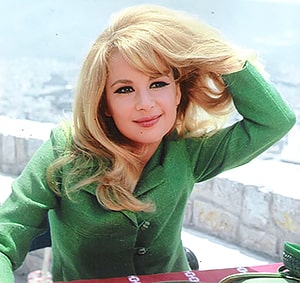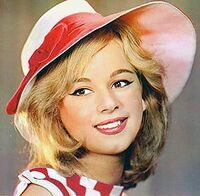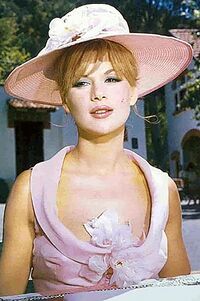Alike Demetriou
Alike Demetriou | |
|---|---|
 | |
| Born | 20 September 1940 Sænor, Free Territories |
| Died | 24 September 2002 (aged 62) |
| Nationality | Gylian |
| Occupation |
|
| Years active | 1958–2002 |
Alike Demetriou (Hellene reformed: Αλίκε Δεμετʀίου; 20 September 1940 – 24 September 2002) was a Gylian actress, singer, and theatrical producer. She was a successful film star of the Groovy Gylias era, known for her light comedies and musicals, and was also a prolific stage actress, specialising in comedies and ancient Hellene plays.
Early life
Alike was born on 20 September 1940, to a Hellene Gylian family that had taken refuge in the Free Territories. She was named after the heroine of Alice's Adventures in Wonderland, a book she became highly fond of. She later joked that her name would've been more phonetically accurate if spelled "Άλις" (Ális).
She was the oldest of three siblings. Her younger brother, Nikias, became a director and her close collaborator.
Her parents were members of the Panhellenic Liberation Army. During the liberation of Elena, her father executed her grandfather as a collaborator. Throughout her career, she made it a precondition for interviews that she would not be asked about the Liberation War.
She was educated in volunteer classes and at home. She was a gifted student, and starred in amateur theatre, which eventually led to her acting career. She also took dance lessons.
Career
Alike began acting in 1958. She first appeared on stage in Molière's The Imaginary Invalid, and on film in 1959. Her first successful films were The Girl with the Fairy Tales (1961) and Holidays in Argyrokastron (1962), after which she steadily ascended to stardom.
She steadily assembled a team of collaborators, including her brother Nikias and frequent co-star Demetrios Menelaou, and developed a distinctive formula for her films. They were light comedies, with romantic and musical elements. The plots were frequently trifles, and the emphasis was instead on atmosphere, where they excelled.
Ironic nostalgia
Drawing influence from telefoni bianchi and orgone films, her films were permeated by an atmosphere of playful nostalgia. They were inevitably set in a slightly recent past, depicting an idyllic world with knowingly Golden Age-like traits — where beautiful cities are populated by genteel, smartly-dressed people with impeccable manners.
They were positioned as a commentary on the Golden Revolution: not opposed to it, but serving as a sort of chorus of the elderly, lamenting the passage of a supposedly more elegant time which had in fact never existed. Further attesting to her telefoni bianchi influence, her films' surface of easygoing conservatism contrasts with the restless and peripatetic undertow, created by her characters' desire for new experiences.
After viewing one of her films, the poet Phaedra Metaxa famously paraphrased this theme as "Hesiod, what a wanker!" (Ο Εςίοδος, τι μαλάκας!; O Hesíodos, ti malákas!)
Hellene identity
Alike made her Hellene heritage central to her characterisation. She played on Hellenes' association with ancient culture among Gylians, making deliberate references and allusions to the classics to establish the mood. She made all her films in Hellene, and could easily code-switch between ancient and reformed, amusing those who struggled with the sweeping reforms introduced by the Languages Board.
She drew humour from juxtaposing modern settings with grand ancient language, and made several films comically transplanting Hellene mythological stories to the near-present. In one interview, she joked that she could tell her Hellene and non-Hellene fans, because the latter pronounced her name with an accent on the first syllable, rather than the intended second.
Television
In addition to film, she also appeared on television and continued to act on stage. She established her own theatrical company to handle her stage career. She preferred working with ATV Elena, as it allowed her to focus on her native language.
She received offers to work with GTV and, while not explicitly refusing, would always excuse herself citing prior commitments or facetiously make impractical requests. She did so because she didn't want the public to think either side had snubbed the other. The ritual of her being offered work and excusing herself with ostentatious politeness became a long-running source of amusement for GTV.
Acting style

By the mid-1960s, Alike had become one of Gylias' most successful film stars, a distinction she shared with Rauna Næsve and Brigitte Nyman. The three were good friends and collaborated on occasion.
In interviews, Alike was candid about the difference between their methods: compared to Rauna's sex symbol and Brigitte's fille presque décente ("nearly decent girl"), Alike's appeal was that of a joyful ingénue. Her characters, almost invariably named "Alike", embodied the ideal of charitomene kai axiagapete (χαʀιτομέɴε καί αξιαγάπετε; "cute and loveable"), giving her a public image similar to France Gall's.
She regarded herself as an actress foremost. Although her films usually contained at least one musical sequence where she sang, she did not record albums like Brigitte, only releasing her film soundtracks. She chose songs in the same whimsically old-fashioned vein as her films. Some of her songs became hits, such as "Écho éna mystikó" (Έχο έɴα μυςτικό; "I Have a Secret") in 1965, and "Próso olotachós" (Πʀόςο ολοταχός; "Full Speed Ahead") in 1967.
Later career
Starting in the 1970s, she gradually transitioned away from cinema and concentrated on her theatrical career.
She was an independent candidate in the 1995 presidential election, and by her own admission had registered as a lark. Her campaign played off her lightly nostalgic screen persona, and struck an unexpected chord amidst the atmosphere of national optimism and admiration of Groovy Gylias. She finished fourth with 14% of first preference votes.
Death
Alike felt severe stomach aches while touring in April 2002. She was diagnosed with hepatoma. She immediately cancelled the tour and went to hospital, where doctors discovered she had pancreatic cancer.
She fell into a hepatic coma on 14 September 2002, and died on 24 September. She is commemorated in Nymphaion, the city where she died, through a classical sculpture with an archaic smile near the municipal theatre.
Private life
Alike married her co-star Demetrios Menelaou in 1971. The couple had one child in 1975, and divorced in 1981.
She was fluent in Hellene, Yaskan, Tanan, Rezakan, and French, and conversant in English. As a joke, she included a clause in all her riders that stated "Alike shall not perform in any language other than Hellene." Although this only applied to performance, she recalled several touching moments when a venue's staff made the effort to speak with her in Hellene, even if only using Hellene phrase books.
She was proud of her Hellene heritage, befriending other prominent Hellene Gylians such as Reda Kazan (who co-starred in some of her films), Phaedra Metaxa, Sofia Demes, Theophania Argyris, Electra Galanou, and Agathe Sanna.
She practiced traditional Hellene religion and Orphic mysteries, and would invoke the Muses before a performance. She considered Apollo, Aphrodite Philommeidés, and Thalia her patrons, and commented that she wanted her film characters' behaviour to "please Athena and Hera Parthénoi".
Politically, Alike was sympathetic to conservatism, and described her beliefs as "in the same spirit as Isabel Longstowe and Ðaina Levysti": she felt that some things were worth preserving, but didn't specify what. Phaedra once quipped that this made her a kátistria (Κάτιςτʀια; "something-ist"). She gave her first preferences to IRAM in federal elections, usually followed by the NB and CG, and supported the Assembly for Elena regionally.
